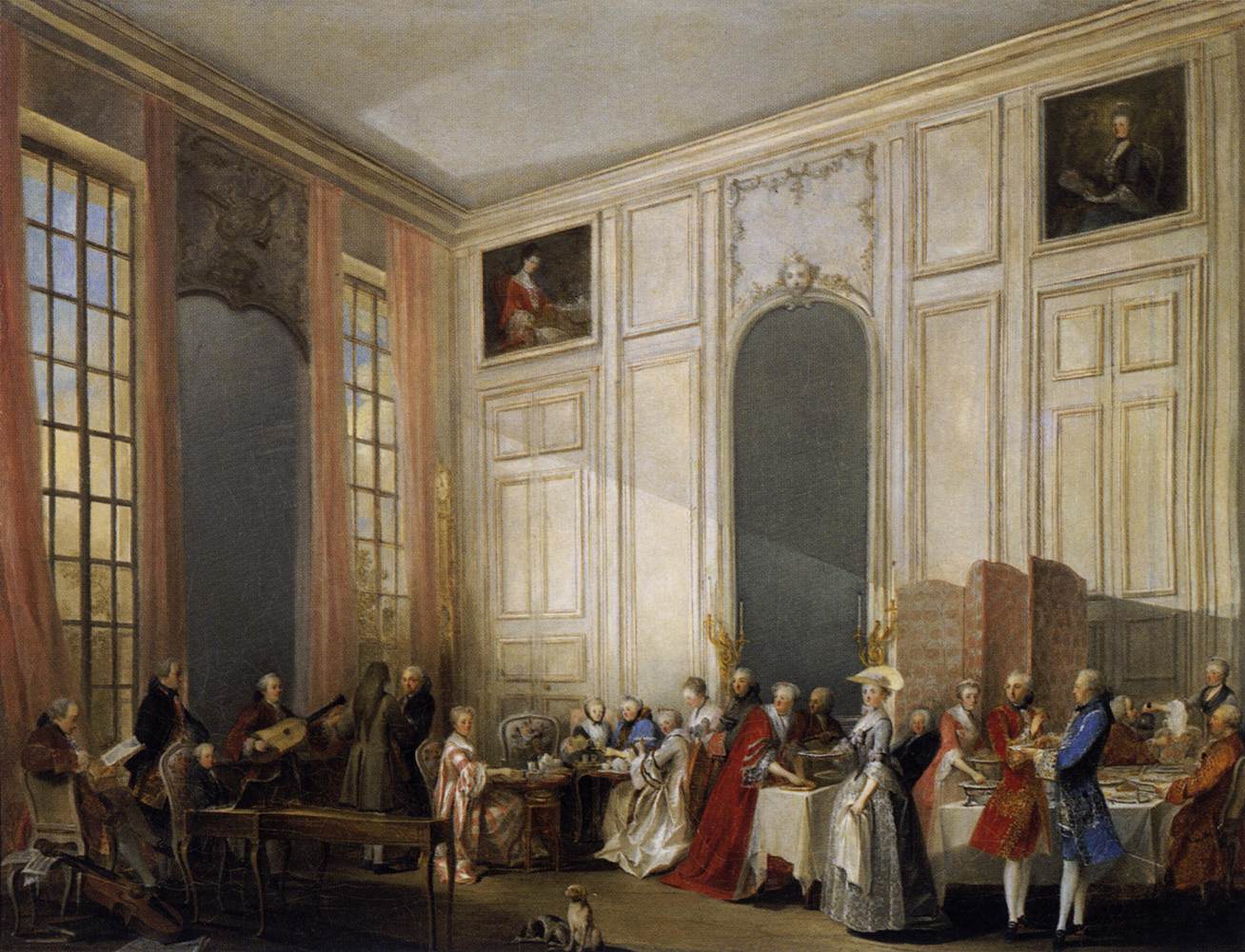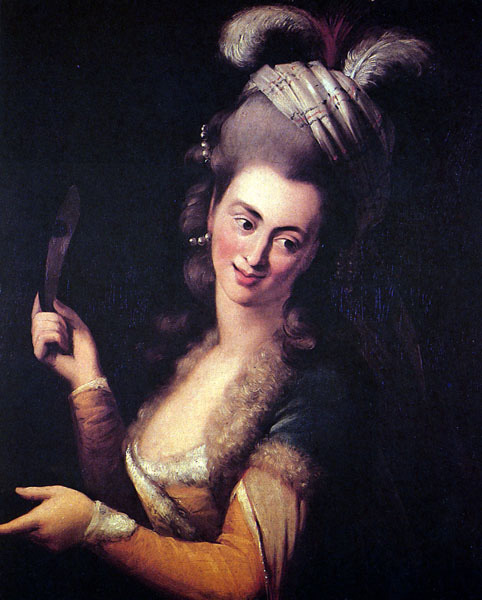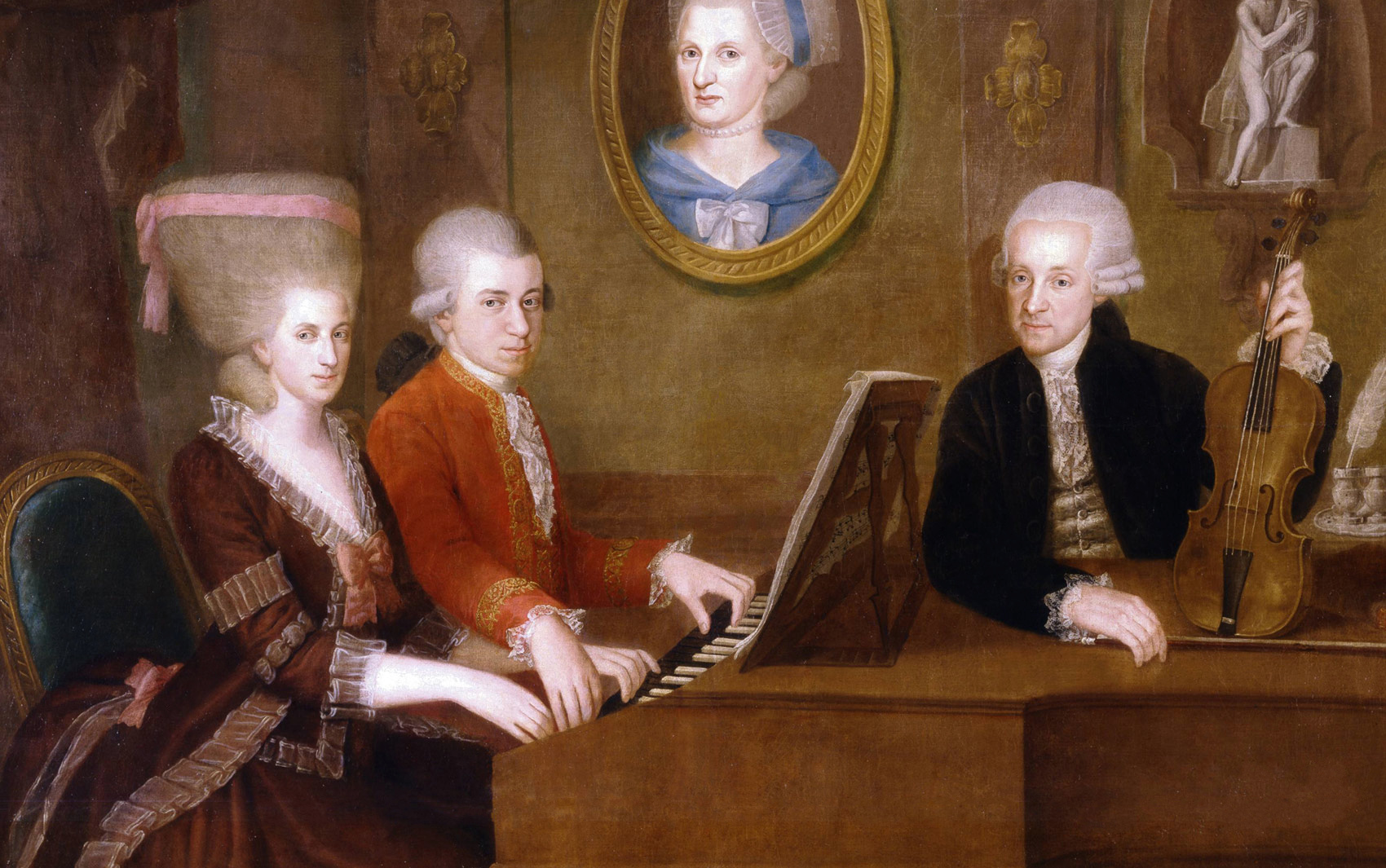Wolfgang Amadeus Mozart is 258 years old, but we still hear his amazing music everywhere. He is undoubtedly one of the most influential and famous classical composers. So successful, so talented, and beginning at such a young age, too! So, what is the deal with this dude? What is the story of his life?
_jouant_%C3%A0_Paris_avec_son_p%C3%A8re_Jean..._-_Google_Art_Project.jpg) |
| The Mozarts |
Little Wolfgang was born on January 27th, 1756, in Salzburg, the capital of Archbishopric of Salzburg, part of the Holy Roman Empire (today part of Austria). His dad, Leopold, was a music teacher, composer, and violinist. His mother's name was Anna Maria, and his older sister's name was Maria Anna, affectionately nicknamed
“Nannerl.” Being born into this very musical family evidently made Wolfgang and his sister interested in music. Nannerl was being taught to play the harpsichord by her father when she was seven. Wolfgang looked up to his sister and wanted to learn how to play, too. By age five he was already composing music, and was playing different instruments. The parents knew their children both had awesome talents, and so they devised ways to exhibit them.
The Mozarts traveled around Europe beginning in 1762, when Wolfgang was only six-years-old. They played for Vienna's rich and noble society, which included Empress Maria Theresa at the Imperial Court. After that they traveled to France and played for the likes of King Louis XV and Madame de Pompadour, then to England to play for King George III and his Queen, to which Wolfgang dedicated six of his beautiful sonatas. Wolfgang met Johann Christian Bach, son of
the Johann Sebastian Bach. As you can imagine, the Mozarts were rock stars, and their wallets were full from all these concerts they were so heavily paid for.
 |
Afternoon Tea at the Temple by Michel-Barthélémy Ollivier
Wolfgang is the little guy on the far left. |
After a brief break from show-business, Leopold and Wolfgang arrived in Italy in 1769 (the year Napoleon was born). During this visit, Wolfgang wrote some operas, which were all big hits. It was the usual business for the Mozarts, and in only a few years they were back at Salzburg.
 |
| Mozart as a young man |
Wolfgang was now a young man when he returned to good ol' Salzburg. The ruler of Salzburg, Count Hieronymus von Colloredo, hired him to be a court musician (the 18th century equivalent of a record deal). 'Twas the good life for Wolfgang, but he really didn't get paid that much. He believed he deserved more, but when he went searching for better pay in Vienna and Munich, nobody offered him any better. Alas, for poor, young Wolfgang it was not to be—but he did not lose hope!
 |
| Aloysia |
Wolfgang, twenty-one years old, gave up being a plain court musician, and with his mother, searched for bigger and better things. The mother and son had a swell time in Mannheim. Although Wolfgang didn't find the job was he was looking for, he found plenty of places to give concerts, have fun, and he fell in love. That's right! She was a singer named Aloysia Weber. Aloysia came from a musical family and, according to Mozart, had a wondrous voice—and judging from her portraits, she was far from bad-looking, too. However, she didn't show very much interest in marrying him. So Wolfgang sang a heartfelt and beautiful song for her:
“Leck mir das Mensch im Arsch, das mich nicht will,” which roughly translates to
“if you don't like me you can lick my buttocks.” They never really talked again.
Childish Wolfgang's search for a career was an epic failure so far, but he had a good time for the most part, and that's great, right? He was now in Paris, and Leopold wished for his son and wife to introduce themselves to the court of Versailles. It seemed doable for Wolfgang. However, the Parisians didn't remember him, and if they did, it was only as a mere child star, and hardly anything more. To make things worse, Wolfgang and his mom were low on cash, not to mention his mother was sick. Mrs. Mozart passed away not long after they arrived. It was a miserable period in his life, as one can easily imagine. He failed to gain any inspiration, he was grieved at his loss, and he loathed Paris.
 |
Nannerl and Wolfgang at the fortepiano with their father.
A portrait of their late mother hangs on the wall. |
As any sane man would do, given it was possible, he returned home to Salzburg. Leopold and his son did not have a great relationship. Wolfgang was defiant and strived to be the very best, and went against his father's wishes by not wanting to accept another job at Salzburg. Wolfgang instead went to Vienna in search of better work.
 |
| Constanze |
Vienna was a great place of opportunity. Wolfgang taught, wrote many pieces and played concerts. Before long Wolfgang was in love with Aloysia's sister, Constanze. She loved music too, especially Bach's religious music. This made him more interested in baroque music, and he studied it very much during this period. Although Leopold would not hear of their marriage, the lovers married anyway in 1782, and they proved to be a very happy couple. They had two children who survived infancy.
 |
| A genius at work |
Everything was starting to fall happily into place. Wolfgang had his brilliant inspiration once again, and during this period he wrote many of his greatest masterpieces. He performed his piano concertos, which were very popular and greatly acclaimed. His opera
The Abduction from the Seraglio was a delightful success. A few years later, Wolfgang teamed up with Lorenzo Da Ponte, a librettist, and as a team they wrote sensational operas. In 1786
The Marriage of Figaro was premiered, and it was a huge hit. It's celebrated even today as one of the greatest operas, and it is doubtlessly one of Wolfgang's most well-known works. A year later, another enjoyable opera,
Don Giovanni, was premiered.
Eine Kleine Nachtmusik, a set of serenades, was also written. We seem to never hear the end of that famous first movement! Contrary to the belief that he wasn't very well-known until after his death, during this period in his life he was really renowned throughout Europe as a composer. (Although he is more famous today.)
 |
| Leopold |
Leopold passed away the same year, and their tensions remained unresolved. Although they had their quarrels, they were father-and-son, and Wolfgang was embittered from his loss, as anyone would be. After all, he was only human. In 1787 he became Emperor Joseph II's chamber composer. In this job he wrote hip dance music. This brought him cash, and, as I'm sure won't surprise you, he spent it—a bit too carelessly, however. He lost his money as soon as he earned it. Wolfgang was a fop-at-heart and had a soft spot for fancy clothes. His lavishness eventually caught up with him, and even the wealth brought from his music was not enough to support the family. Not to mention Constanze was sick, and the treatments were very costly. He now had to beg for money from his friends, but he always made sure to pay them back.
 |
| Wolfgang, c. 1790 |
Wolfgang traveled around in search of fortune, but alas! nothing could not bring his family out of their struggles. He wrote another highly successful opera,
The Magic Flute. But perhaps the most intriguing work of this period was his final piece, the unfinished
Requiem Mass in D minor. Isn't the fact that a requiem was his last masterpiece so strangely coincidental?
Franz von Walsegg was the sorrowed man who commissioned the requiem, following the death of his wife. Instead of requesting it himself, he remained anonymous and sent intermediaries. Franz was an aspiring musician, but far from a respectable one; he would often commission works and then take the credit for them. Nevertheless Wolfgang began writing this requiem for the mysterious, faceless stranger. It was melodramatic, intensely emotional and devoutly spiritual. The musician himself was feeling very depressed. Franz Xaver Niemetschek, the first biographer of Mozart, wrote of him:
“On his return to Vienna, his indisposition increased visibly and made him gloomily depressed. His wife was truly distressed over this. One day when she was driving in the Prater with him, to give him a little distraction and amusement, and they were sitting by themselves, Mozart began to speak of death, and declared that he was writing the Requiem for himself. Tears came to the eyes of the sensitive man: ‘I feel definitely,’ he continued, ‘that I will not last much longer; I am sure I have been poisoned. I cannot rid myself of this idea.’”
There have been rumors that Antonio Salieri, a fellow composer and teacher of Beethoven, Franz Schubert and Franz Liszt, indeed poisoned him, but we will never know. He was very disturbed by these accusations, and they contributed to his nervous breakdowns.
Wolfgang, bedridden and pathetic, was claimed by Niemetschek to have said:
“On the day of his death he asked for the score to be brought to his bedside. ‘Did I not say before, that I was writing this Requiem for myself?’ After saying this, he looked yet again with tears in his eyes through the whole work.”
On December 5th, 1791, the composer died. He left behind him so many works. Even 223 years after his death, we cherish and admire his craftsmanship, and I'm sure even 1,000 years from now we will still remember his music. Wolfgang Amadeus Mozart is one of the very staples of classical music.
 |
| Wolfgang, 14 years old |



_jouant_%C3%A0_Paris_avec_son_p%C3%A8re_Jean..._-_Google_Art_Project.jpg)








